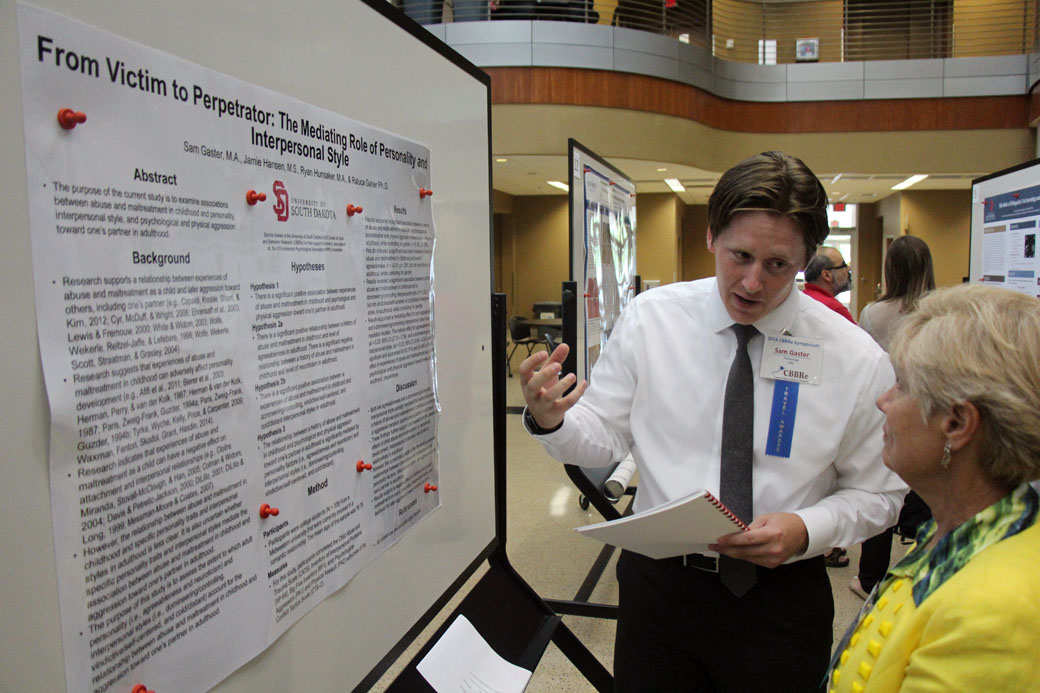
One-of-a-kind state neurological research center pushes for strides on a local, national level
They might not be able to go to a physical location on campus, but the students who participated in the Summer Program for Undergraduate Research in Addiction (SPURA) are still working for a common cause.
Throughout the summer, eight USD undergraduates participated in the 12 week program, which allowed students like junior Melissa Prince to conduct research focussing on things like substance abuse and related or underlying mental health issues. Students then presented their findings to a one-of-a-kind program found nowhere else in South Dakota — the Center for Brain and Behavioral Research’s (CBBRe) first research symposium.
Prince’s research and the research of her fellow students and colleagues was presented Aug. 21. The event, held at the Andrew E. Lee Memorial Medicine and Science building, celebrated the one year anniversary of USD’s research center and featured presentations ranging from depression to neural responses to fear.
“I feel very fortunate I was given this opportunity,” Prince said. “It helped me to see other research that was being conducted on campus.”
Prince centered her research project on decision making and anxiety during social stress as it relates to domestic abuse. Prince said the research conducted during the SPURA program helped her to network with professionals in the neurological fields of study while also meeting people from other departments who could help her in her research.
The center is an interdepartmental organization of USD’s neural science and behavioral science community, said Brian Burrell, associate director for the CBBRe.
“Our goal is to have a nationally recognized center with extramural support that people will want to come to to receive their training and also to help develop treatments in the long term for various neurological or behavioral disorders,” he said.
Burrell said the work completed at the center is university wide and involves researchers from many different fields and majors at USD including biology, psychology, communication disorders, counseling and education, and Sanford research. Burrell also said neurological disorders may be one of the most important public health issues faced by Western countries.
“Probably the most complex organ in our bodies is the brain and the central nervous system, so it’s not surprising that it’s a very difficult clinical condition to treat,” he said.
Undergraduates were not the only ones to take advantage of the symposium. Graduate students like Sam Gaster also presented the results of their multiple research projects.
Gaster, a psychology graduate student, was the winner of the Fall 2014 Travel Award for his research on the correlation between early childhood abuse and later domestic abuse. Thanks to funding from the CBBRe, Gaster was able to travel to Washington D.C. to present his research to the American Psychological Association.
“There’s substantial research — theoretical and empirical research — showing that these extraordinarily traumatic experiences in childhood can shape childhood development,” he said. “What we showed was that people can carry a lot of that into adulthood and that brings about sometimes assault or aggression toward one’s partner.”
The research center is the only one of its kind in the state, and Gina Forster, the director of the CBBRe said the research done through it will strive toward solving neurological disorders in an innovative and quick fashion.
“For the average person, there is going to be someone in your family that has suffered from something and the ability to bring neuroscientists and behavioral scientists together to address these problems in a little bit of a different way will hopefully speed up our understanding and treatment,” she said. “As a center, we provide pilot funds for individuals to start projects. Then they can go to the federal government so they can say ‘I’ve started this project, we’ve got this great question, and look we can do it because we’ve already started it.'”
[notification type=”grey” title=”CBBRe focus areas”]1. addiction and substance dependence 2. depression and anxiety 3. learning disorders 4. stroke 5. traumatic brain injury[/notification]
